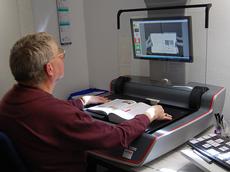A thorn in the side for science publishers
Several publishers of scientific journals are upset about an important service provided by the ETH-Bibliothek: the electronic document delivery service. The Director of the ETH-Bibliothek, Wolfram Neubauer, gives his view on the legal dispute.

Acquiring and supplying all kinds of information, as well as indexing it and presenting it in a user-friendly manner, are the core tasks of any academic library. These activities provide important framework conditions for the process of gaining knowledge and understanding. An academic library’s functions also traditionally include delivering copies and/or scans of scientific articles.
At the end of 2011, the International Association of Scientific, Technical and Medical Publishers (STM) lodged a complaint against the document delivery service of the ETH-Bibliothek at the Commercial Court of Zurich. The actual complainants in this case are the publishers Elsevier, Springer and Thieme, although they are supported, at least in a moral and financial sense, by the other members of the association.
STM is pushing for the ETH-Bibliothek to be prohibited from delivering scans from scientific publications to customers within Switzerland. Its main argument here is based on the statement provided by the publishers’ representatives to the effect that the science publishers would run their own document delivery services, which would be equally capable of ensuring the provision of information for research and development.
Moreover, the publishers’ representatives allege that the delivery of electronic copies of articles is in breach of the relevant provisions of Swiss copyright law, thus making it illegal.
In compliance with Swiss copyright law
However, ETH Zurich and the ETH-Bibliothek, as the organisation providing the service in question, take precisely the opposite stance: the “delivery of electronic copies of documents” service mentioned is covered by the corresponding article in the Swiss Copyright Act. Furthermore, the ETH-Bibliothek pays the appropriate fees for this to ProLitteris, the collecting agency responsible. The ETH-Bibliothek therefore considers that it is rendering a useful service within the copyright regulations that apply to Switzerland as a centre of research and under acceptable financial conditions.
It goes without saying that a number of publishers have now set up their own delivery services. These, however, are far less attractive to interested academics, firstly because the costs are drastically higher than those for the service provided by ETH Zurich, and secondly because it is also considerably more difficult to actually make use of these services.
The document delivery service offered by the ETH-Bibliothek provides a central point of contact, so that users do not have to be familiar with the various price structures, delivery conditions and payment methods used by different publishers. This naturally makes it significantly easier to use a combination of different information sources.
Public services versus commercial interests
Academics at ETH Zurich are not specifically affected by the provision of information from scientific publications. All existing publications for science, research and education are still available to the ETH community without restrictions. This situation is not expected to change in the foreseeable future.
The response from the aforementioned publishers serves as an example of how the interests of science and research are being forced to give way to those of the publishers, since the argument put forward by them or their representatives clearly fails to take the following points into account:
- More or less all scientifically relevant journals rely on the results of publicly funded research.
- The brunt of evaluating scientific findings (i.e. peer reviewing) is borne by the scientific community, with the publishers playing only a supporting role.
- By far the most important customers for all major science publishers are academic libraries, the vast majority of which are themselves supported by public funding.
In the legal proceedings, the aim must therefore be to strike a balance between the services provided by the ETH-Bibliothek for the benefit of science and research on the one hand and the commercial interests of the publishers on the other.
ETH-Bibliothek
The ETH-Bibliothek is the main library of ETH Zurich (Swiss Federal Institute of Technology, Zurich). It serves as a central information facility for technology and the natural sciences for the Swiss science location. Its holdings contain approximately 7.7 million documents and range from traditional media such as printed books through to extensive electronic information resources. As a public library, it provides information to institute employees and students, members of the public with an interest in technology and science and companies that conduct research and development. Wolfram Neubauer is the director of the ETH-Bibliothek.
- 01.03.12: ETH-Bibliothek: Elsevier boykottieren
- 29.02.12: Elsevier boykottieren
- 28.02.12: Elsevier, Springer and Thieme
- 22.02.12: ETH-Bibliothek: Your are not alone
- 22.02.12: ETH-Bibliothek: Freedom of Science Information
- 21.02.12: ETH-Bibliothek: Elsevier and Mathematics
- 19.02.12: ETH-Bibliothek: Angriff an die Freiheit elektronischer Medien
- 17.02.12: ETH-Bibliothek: Open Access als Alternative zum Dokumentlieferdienst
- 17.02.12: ETH-Bibliothek: ETH macht tollen Job
- 17.02.12: ETH-Bibliothek: Den Verlagen ein Dorn im Auge







READER COMMENTS